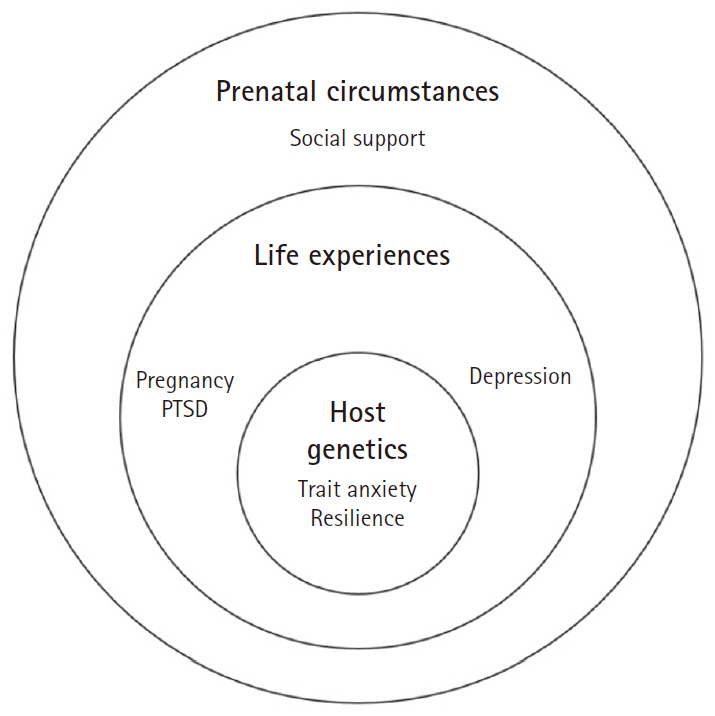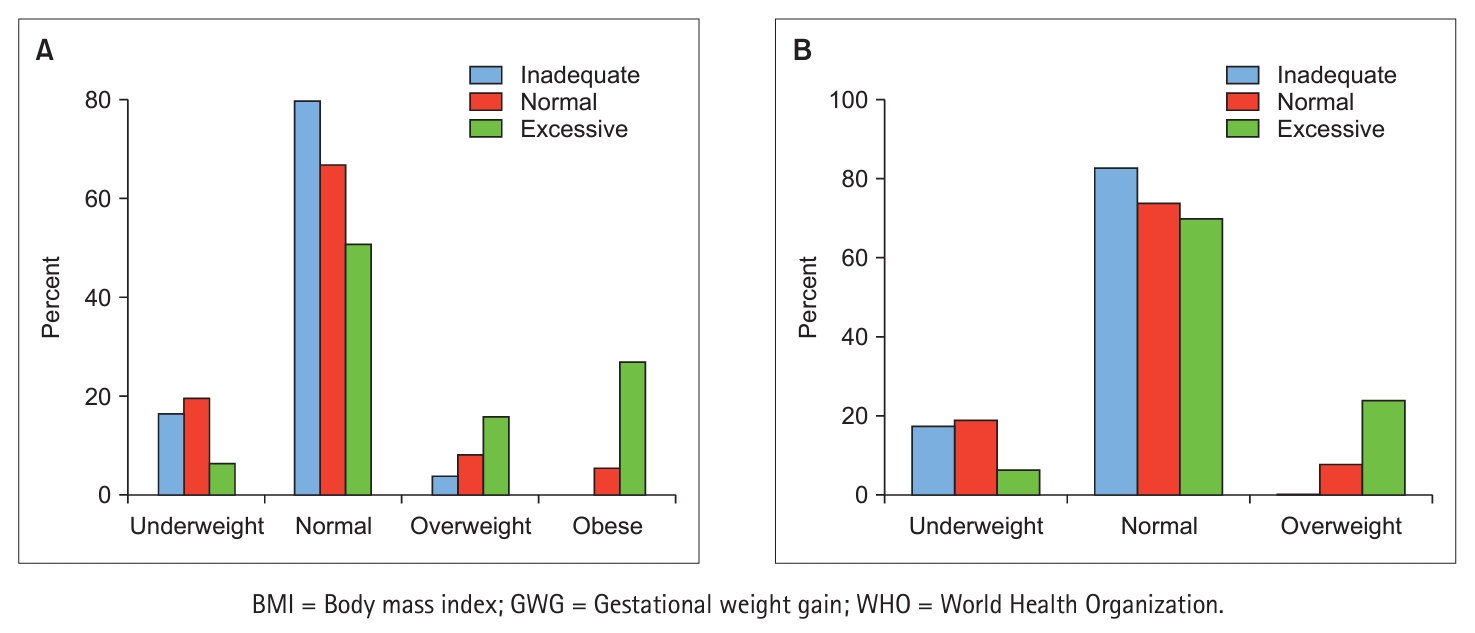Search
- Page Path
- HOME > Search
- Prenatal psychosocial factors and postpartum post-traumatic stress disorder in low-risk postnatal women: a longitudinal study
- Jung Hee Yeo, So Yeon Park
- J Korean Acad Nurs 2025;55(3):353-363. Published online August 21, 2025
- DOI: https://doi.org/10.4040/jkan.25027

-
 Abstract
Abstract
 PDF
PDF ePub
ePub - Purpose
This study aimed to identify prenatal psychosocial factors influencing the development of postpartum post-traumatic stress disorder (PTSD) in both short-term (4–6 weeks postpartum) and long-term (4–6 and 14–18 weeks postpartum) assessments using the wheel model.
Methods
This study employed a longitudinal design with 359 women in their third trimester who received care at two maternity hospitals in City B. Surveys were used to measure depression, anxiety, resilience, and pregnancy-related PTSD during the third trimester (n=318). Postpartum PTSD was assessed at 4–6 weeks (n=198) and at 14–18 weeks postpartum (n=156). Data were analyzed using the t-test, chi-square test, and logistic regression.
Results
The prevalence of short-term postpartum PTSD was 32.7%, and that of long-term PTSD was 19.9%. The risk of short-term PTSD increased with higher pregnancy-related PTSD symptoms (odds ratio [OR], 1.04; 95% confidence interval [CI], 1.02–1.07), higher prenatal resilience (OR, 1.09; 95% CI, 1.00–1.18), and lower social support (OR, 0.93; 95% CI, 0.87–0.99). Similarly, the risk of long-term PTSD increased with higher pregnancy-related PTSD (OR, 1.09; 95% CI, 1.04–1.13), higher prenatal resilience (OR, 1.19; 95% CI, 1.06–1.34), and low educational attainment (OR, 6.75; 95% CI, 1.03–44.30).
Conclusion
The high prevalence of short- and long-term postpartum PTSD highlights the need for systematic screening and interventions for prenatal factors, including pregnancy-related PTSD, social support, resilience, and education level. Therefore, it is necessary to alleviate pregnancy-related PTSD and strengthen social support during prenatal care to prevent postpartum PTSD. Furthermore, women with high resilience should also be targeted in these interventions, because they can also develop postpartum PTSD.
- 1,394 View
- 143 Download

- Perceptual Factors Associated with Gestational Weight Gain: A Cross-Sectional Survey
- Sehee Kim, Sukhee Ahn
- J Korean Acad Nurs 2024;54(4):495-508. Published online November 1, 2024
- DOI: https://doi.org/10.4040/jkan.24052

-
 Abstract
Abstract
 PDF
PDF ePub
ePub Purpose Recent years have seen an increase in the number of pregnant women whose weight gain during pregnancy exceeds the recommended range. This study was intended to determine the relationships among demographic attributes, key perceptual factors, and gestational weight gain (GWG).
Methods This cross-sectional study was conducted between April and July 2022. First-time pregnant women beyond 36 weeks of gestation who were recruited via social media completed an online survey. Data were analyzed using one-way ANOVA, chi-square test, and logistic regression, all performed using SPSS software.
Results Of the 369 participants, 63 (17.1%) exceeded the recommended GWG guidelines, while 148 (40.1%) fell within the recommended range, and the remaining 158 (42.8%) had inadequate GWG. Being overweight or obese before pregnancy significantly increased the risk of excessive GWG (
p < .001). This risk was also significantly greater for women with low internal weight locus of control (OR = 0.58, 95% CI 0.41~0.82), high external weight locus of control (OR = 1.75, 95% CI 1.31~2.34), and negative body image (OR = 0.62, 95% CI 0.51~0.75).Conclusion The growing trend of excessive GWG among pregnant women is influenced by a combination of prepregnancy body mass index (BMI) and perceptual factors, including weight locus of control and body image. These findings underscore the need to implement weight management intervention strategies before pregnancy, taking into consideration BMI, and to enhance positive body image and internal locus of control.
-
Citations
Citations to this article as recorded by- Factors Associated With Gestational Weight Gain Among Nurses in Korea
Sook Jung Kang, Woon Young Hwang, Hyunju Dan, Sue Kim, Kwang-Pil Ko
Journal of Obstetric, Gynecologic, & Neonatal Nursing.2025; 54(5): 543. CrossRef - Attitudes toward body weight and shape during pregnancy among Japanese women who were underweight before pregnancy: A qualitative study
Chisato KOROGI, Mie SHIRAISHI, Kaori MATSUDA, Natsuki HORI, Hanna HORIGUCHI
Journal of Japan Academy of Midwifery.2025; 39(3): 456. CrossRef
- Factors Associated With Gestational Weight Gain Among Nurses in Korea
- 2,735 View
- 107 Download
- 1 Web of Science
- 2 Crossref

- Effects of a Mobile Web-based Pregnancy Health Care Educational Program for Mothers at an Advanced Maternal Age
- Hee Jung Wang, Il Ok Kim
- J Korean Acad Nurs 2015;45(3):337-346. Published online June 30, 2015
- DOI: https://doi.org/10.4040/jkan.2015.45.3.337
-
 Abstract
Abstract
 PDF
PDF Purpose This study was conducted to develop a mobile web-based pregnancy health care educational program for mothers who were at an advanced maternal age (AMA) and to verify the effects of the program on pregnancy health care.
Methods This program was developed using a web-based teaching-learning system design model and composed of 10 subject areas. This research was a quasi-experimental study using a non-equivalent control group pretest-posttest time serial design and data were collected from April 2 to May 3, 2014. To verify the effects of the program, it was used for 2 weeks with 30 AMA mothers (experimental group). For the control group, a classroom education booklet for pregnant women used with 31 AMA mothers.
Results The experimental group having participated in program had statistically significantly higher scores for knowledge (t=3.76,
p <.001), self-efficacy (t=8.54,p <.001), and practice behavior (t=4.88,p <.001) of pregnancy health care, compared to the control group.Conclusion The results of the program indicate that a Mobile web-based pregnancy health care educational program is effective in meeting the needs of AMA mothers and can be used as the prenatal educational program for AMA mothers and is appropriate as an educational media for theses mothers.
-
Citations
Citations to this article as recorded by- Risk factors for inadequate and excessive gestational weight gain during pregnancy among women
Ju Sun Cho, Sook Jung Kang
Midwifery.2025; 144: 104345. CrossRef - Development and Effect of Prenatal Education Programs Using Virtual Reality for Pregnant Women Hospitalized With Preterm Labor: Experimental Study
SeoA Park, Hyeyoung Kim
Journal of Medical Internet Research.2025; 27: e75585. CrossRef - The Effects of a Smartphone-Based Education Program Designed to Help Mothers Safely Administer Medication to Their Children
Na-Gyeung Kang, Mi-Ae You
CIN: Computers, Informatics, Nursing.2023; 41(2): 77. CrossRef - Prevalence and associated factors of prenatal depression in pregnant Korean women during the COVID-19 pandemic: a cross-sectional study
Mi-Eun Kim, Ha-Neul Jung
Korean Journal of Women Health Nursing.2023; 29(4): 274. CrossRef - Physical exercise ameliorates memory impairment in offspring of old mice
Tae-Woon Kim, Sang-Seo Park, Hye-Sang Park
Journal of Exercise Rehabilitation.2022; 18(3): 155. CrossRef - Educational Status and Needs of Premature Birth Prevention and Its Association with Preconception Health Behavior among Women of Childbearing Age in Korea
Sun-Hee Kim, Ji-Yeon Hong, Mi Kyung Park
Journal of Korean Academy of Community Health Nursing.2022; 33(4): 372. CrossRef - Evaluation of a Mobile-based Maternal Feeding Education Program for Overweight Prevention in Infants
Jin Suk Ra
Asian Nursing Research.2021; 15(2): 136. CrossRef - Effect of Oral Health Education Using a Mobile App (OHEMA) on the Oral Health and Swallowing-Related Quality of Life in Community-Based Integrated Care of the Elderly: A Randomized Clinical Trial
Ji-Yun Ki, Se-Rim Jo, Kyung-Sook Cho, Jung-Eun Park, Ja-Won Cho, Jong-Hwa Jang
International Journal of Environmental Research and Public Health.2021; 18(21): 11679. CrossRef - Effects of a supportive program on uncertainty, anxiety, and maternal-fetal attachment in women with high-risk pregnancy
Hyun Jin Kim, Nami Chun
Korean Journal of Women Health Nursing.2020; 26(2): 180. CrossRef - Prenatal nursing intervention studies published in Korean nursing journals: a scoping review
Seo Yun Kim, Hae Won Kim
Korean Journal of Women Health Nursing.2020; 26(2): 109. CrossRef - A study on the experience of mHealth based on health belief model: Focus group interview
Na Young Park, Jeong Hae Hwang, Yun-Kyoung Choi, Seong-Hi Park, Yeon Kyung Lee
Korean Journal of Health Education and Promotion.2019; 36(3): 97. CrossRef - Development and Effects of a Sex Education Program with Blended Learning for University Students
Il-Ok Kim, Gye Jeong Yeom, Mi Jeong Kim
Child Health Nursing Research.2018; 24(4): 443. CrossRef - Trends and research issues of mobile learning studies in nursing education: A review of academic publications from 1971 to 2016
Ching-Yi Chang, Chiu-Lin Lai, Gwo-Jen Hwang
Computers & Education.2018; 116: 28. CrossRef - Effect of Visiting and a Smartphone Application Based Infection Prevention Education Program for Child Care Teachers: A Non-Randomized Controlled Trial
Yun Jeong Yang, In Soo Kwon
Journal of Korean Academy of Nursing.2017; 47(6): 744. CrossRef - Development of Pre-discharge Group Education Program for Liver Transplant Patients
Ji Seon Yun, Kyung Choon Lim, Jae Sim Jeong, Hea Seon Ha, Jung Ja Hong, Soon Haeng Lee, Lee Young Kim, Yeon Hee Kim, Shin Hwang
Korean Journal of Transplantation.2017; 31(1): 34. CrossRef - Development and Validation of a Postpartum Care Mobile Application for First-time Mothers
Ju Yeon Lee, Hye Young Kim
Korean Journal of Women Health Nursing.2017; 23(3): 210. CrossRef - Development of Postoperative Self Care Mobile App for Kidney Transplantation Patients
Se-Hee Noh, Jeong-Sook Park
Journal of the Korea Academia-Industrial cooperation Society.2016; 17(12): 316. CrossRef - Effects of Web-based Preconception Health Promotion Program for Couples about to be Married
Nam Joo Je, So Young Choi
Journal of Korean Academy of Nursing.2016; 46(5): 720. CrossRef - A Survey of Smartphone-Based Health Education Needs for Parents
Shin-Jeong Kim, Jung Min Lee, Hye Young Min
Child Health Nursing Research.2016; 22(4): 346. CrossRef - Development of a Web-based Sexual Health Program for Women Undergoing Treatment for Gynecologic Cancer and Their Partners
Ju-Hee Nho
Korean Journal of Women Health Nursing.2016; 22(2): 104. CrossRef - Advanced Aged Women's Needs for Pregnancy and Childbirth Care
Hye Young Min, Geum Hee Jeong
Korean Journal of Women Health Nursing.2015; 21(4): 332. CrossRef - A Review on the Use of Effect Size in Nursing Research
Hyuncheol Kang, Kyupil Yeon, Sang-Tae Han
Journal of Korean Academy of Nursing.2015; 45(5): 641. CrossRef
- Risk factors for inadequate and excessive gestational weight gain during pregnancy among women
- 1,388 View
- 12 Download
- 22 Crossref

 KSNS
KSNS
 E-SUBMISSION
E-SUBMISSION

 First
First Prev
Prev


